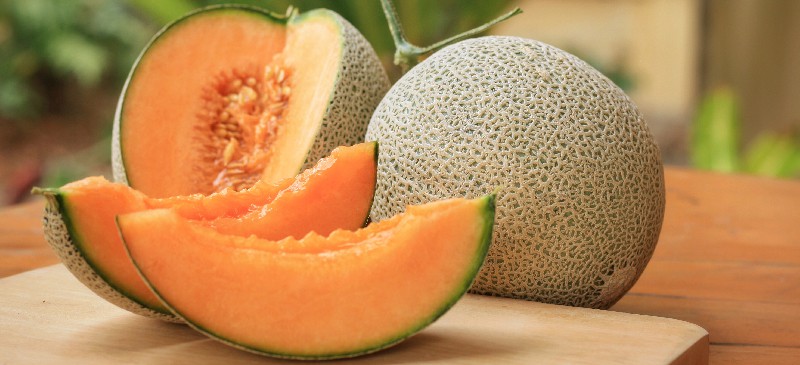
What are the benefits of eating cantaloupe? Cantaloupe is a type of melon fruit that provides a range of antioxidants, phytonutrients and electrolytes that are shown to have multiple health benefits. The nutrients found in cantaloupe nutrition can be spotted in its deep, orange color.
They can help prevent oxidative stress plus a wide range of inflammatory diseases that are prevalent in the U.S. and other Western nations today.
Among other nutrients, cantaloupe nutrition contains two special, protective phytonutrients: carotenoids and cucurbitacins. These are two types of powerful antioxidants that have been linked with the prevention of diseases, including cancer, cardiovascular and neurodegenerative disorders. They also help stop free radical damage within the body and slow the aging process.
Cantaloupe calories are low, but nutrients are high. Vitamin A, found in high levels in cantaloupe, is an antioxidant known for promoting healthy vision and skin, boosting immunity, and reducing inflammation.
Together with the antioxidant vitamin C, which is also present in cantaloupe nutrition in high amounts, these vitamins are essential for maintaining healthy mucus membranes, cellular health and warding off DNA damage that can lead to disease.
Ad

There’s even more to cantaloupe’s many health benefits. Cantaloupe is now used to extract an enzyme called superoxide dismutase (SOD).
This is a strong antioxidant found mostly in the rind of cantaloupe. It plays a vital role as a leading antioxidant that defends the inside of the human body from oxidative stress.
On top of this — although they are usually discarded and only the orange flesh is eaten — cantaloupe seeds also provide important omega-3 fatty acids and are actually edible!
Cantaloupe Nutrition Facts
Is cantaloupe a healthy fruit? While other types of fruits like berries may have higher levels of antioxidants, cantaloupe is commonly eaten in higher volumes. This can make up for the fruit’s lower antioxidant levels.
This means that cantaloupe can in fact significantly increase beneficial levels of phytonutrients in the average person’s diet.
What is the nutritional value of cantaloupe? Cantaloupe nutrition is a great source of vitamin C and vitamin A, in the form of carotenoids. In fact, cantaloupe is one of the highest fruit sources of vitamin A.
Nutrition in cantaloupe also includes potassium, vitamin K, magnesium, fiber and B vitamins, including thiamine, niacin and folate.
How many carbs in cantaloupe? How many calories are in a cup of cantaloupe?
One cup (about 160 grams) of cubed cantaloupe nutrition contains approximately:
- Calories: 54.5
- Total Carbohydrates: 13.1 g
- Fiber: 1.4 g
- Sugar: 12.6 g
- Total Fat: 0.3 g
- Saturated Fat: 0.1 g
- Polyunsaturated Fat: 0.1 g
- Monounsaturated Fat: 0.01 g
- Trans Fat: 0 g
- Protein: 1.3 g
- Sodium: 25.6 mg (1% DV)
- Vitamin C: 58.7 mg (65% DV)
- Vitamin A: 270 mcg (30% DV)
- Potassium: 427 mg (9% DV)
- Folate: 33.6 mcg (8% DV)
- Niacin: 1.2 mg (8% DV)
- Vitamin B6: 0.1 mg (6% DV)
- Magnesium: 19.2 mg (5% DV)
- Vitamin K: 4 mcg (3% DV)
*Daily Value: Percentages are based on a diet of 2,000 calories a day.
In addition, cantaloupe nutrition contains some pantothenic acid, choline, betaine, calcium, iron, phosphorus, zinc, copper, manganese and selenium.
Related: Pawpaw Fruit: 8 Reasons to Add This Antioxidant Powerhouse to Your Diet
Health Benefits
There are so many impressive aspects of cantaloupe nutrition. Some of the top cantaloupe benefits include:
1. Great Source of Vitamin A and Vitamin C
Is cantaloupe a superfood? With all of its amazing nutrients and potential health benefits, many people think so.
Thanks to its high supply of antioxidants vitamin A and vitamin C in the form of ascorbic acid, cantaloupe nutrition helps stop free radical damage by battling oxidative stress in the body. According to research, disease prevention is one major public health benefit that can be achieved by increasing consumption of carotenoid-rich fruits and vegetables, including cantaloupe.
Ad

Cantaloupe nutrition contains two types of vitamin A antioxidants called beta-carotene and alpha-carotene. Because it contains both of these carotenoids, it also contains some of their derivatives, including lutein, beta-cryptoxanthin and zeaxanthin.
A growing body of literature exists regarding the effects of these antioxidants and other carotenoids on chronic diseases in humans, especially related to how they can reduce dangerous inflammation. Inflammation and free radical damage are tied to the formation of various diseases.
Therefore, consuming cantaloupe is an excellent way to build the body’s defense against age-related conditions and to keep the body feeling young and healthy.
2. Fights Cancer with Powerful Phytochemicals
Cantaloupe nutrition is a rich source of antioxidant flavonoids, such as beta-carotene, lutein, zeaxanthin and cryptoxanthin. These antioxidants have a protective role in the body. They protect cells and other structures from DNA damage and stresses caused by free radicals.
Studies show that cantaloupe’s antioxidants and cucurbitacins result in cancerous cell apoptosis, or self-destruction of the cancerous cells. This makes cantaloupe a potential cancer-fighting food.
These helpful chemical pheromones exist naturally in plants in order to protect the plants from external damage, but they also do the same within the human body. Cucurbitacins, for example, repeatedly show anti-cancer activities within the body when studied, ranging from anti-proliferation to cell cycle arrest and cell apoptosis.
It’s believed that these compounds have apoptotic effects because they are able to enter the nucleus of the cell where the DNA or genes are stored and to activate apoptotic proteins that destroy harmful cells.
Additionally, many other studies show that consuming high amounts of fruit and vegetable sources that are naturally rich in vitamin A and vitamin C is one of the best ways to prevent cell mutation. Including five or more fruits and vegetables in your diet every day can help protect from lung, colon, prostate and oral cavity cancers because of these positive protective effects.
3. Contains Anti-inflammatory Properties
Studies show that, in experiments, lower levels of C-reactive protein (CRP) are present within the bloodstream of people who have particularly high intakes of cantaloupe and other fruits. Since CRP is a marker widely used to assess levels of inflammation in the body, this shows positive results for cantaloupe stopping dangerous inflammation and autoimmune responses that can lead to disease.
The anti-inflammatory benefits of cantaloupe nutrition stem back to its cucurbitacins, including cucurbitacin B and cucurbitacin E. These two anti-inflammatory compounds may help alleviate pain and other symptoms caused by inflammatory diseases.
4. May Help Prevent Heart Disease
Many heart-related problems — like high cholesterol, high blood pressure, and a risk for heart attack or stroke — start out with chronic, unwanted inflammation and chronic oxidative stress.
Numerous studies have linked a higher consumption of vegetables and fruits like cantaloupe with a decreased risk of developing cardiovascular disease.
5. Boosts Immunity
The carotenoids found in cantaloupe can help boost the immune system and prevent infections. One specific carotenoid, beta-carotene, has a reputation for boosting immunity in both humans and animals.
Research suggests that beta-carotene may enhance immune cell function. This is the reason why it is so useful in combating not only common illnesses, but also possibly preventing cancer.
Furthermore, this fruit has been shown to strengthen immune defenses in several studies.
6. Helps Muscle Recovery and Stamina
Cantaloupe nutrition offers a moderate amount of the electrolyte potassium. Potassium is an important component of cell and body fluids.
The potassium found in this fruit is an important nutrient for athletes or those who are especially active. It is considered a vasodilator because it relaxes blood vessels.
This lowers blood pressure and protects against muscle cramping. It also allows for quicker muscle recovery and reduced stress on the body as you build muscle, strength and endurance.
7. Protects Eye Health
Cantaloupe nutrition supplies important nutrients that play a vital role in protecting eye health, including beta-carotene, vitamin A, vitamin C, lutein and zeaxanthin.
Zeaxanthin, for example, is an important carotenoid that is absorbed into the eye’s retinal, where it is thought to provide antioxidants and protective UV light-filtering functions.
A study published in 2017 is one of many that shows a link between the antioxidants and carotenoids found in cantaloupe and a reduced risk of age-related macular degeneration.
READ RELATED: ‘I’m a Michelin-Starred Japanese Chef, and These Are My 6 Golden Rules for Grilling the Most Flavorful Foods’
8. Protects Skin Health
Orange-colored foods, including carrots, sweet potatoes, pumpkin and, of course, cantaloupe, are also high sources of carotenoids. Carotenoids can help reduce skin cancer risk.
Some studies even point toward beta-carotene (by itself or in combination with lutein and other carotenoids) possibly being able to decrease the effects of sunburn, while fruit phytochemicals have been found to combat skin damage and carcinogenesis.
9. Good for Digestion
Cantaloupe is an especially hydrating fruit because it is very high in water, like most melons. Its high percentage of water helps the digestive tract maintain hydration, detoxify the body, and properly expel toxins and waste.
Cantaloupe is also known to be easy on digestion and is free of FODMAPs. FODMAPS are difficult-to-digest carbohydrates that can trigger symptoms related to irritable bowel syndrome and other digestive disorders.
10. Helps the Body Detox
Cantaloupe nutrition is again rich with electrolytes, and cantaloupes also have a high water content. This makes it a great choice for homemade detox recipes.
Water-rich foods like melons can help relieve uncomfortable symptoms of bad digestion, including bloating and swelling. The potassium aspect of cantaloupe nutrition triggers your heart to pump blood and your kidneys to filter blood while also helping balance hydration levels within the body. These are all helpful things when you’re trying to detox.
11. Restores the Body’s pH Level
Additionally, melon varieties are considered to be alkaline foods. This means they are able to help bring the pH level of the body back to its natural level.
Some experts believe that disease has a much harder time developing in an alkaline environment inside the body compared to a more acidic system, so eating cantaloupe and other alkaline-forming foods can protect your body from inflammation and disease formation.
A scientific review published in 2012 concludes that there may be several benefits to an alkaline diet, including:
- Benefits to bone health, decreased muscle wasting and a reduction in chronic diseases, such as hypertension.
- An increase in growth hormone, which may improve cardiovascular health, memory and cognition.
- An increase in intracellular magnesium (required for the function of many enzyme systems) and activation of beneficial vitamin D.
- Improved efficacy of some chemotherapy agents.
12. Low in Calories and Helps Support Weight Management
Cantaloupe contains around 54 calories per cup. It also is high in water and various nutrients, making a great addition to any weight management plan.
It is a food with a high nutrient density based on the low amount of calories it has but the high amounts of health benefits it offers overall.
Since those following a low-calorie diet can sometimes experience nutrient deficiencies, poor digestion, low immunity and weakness, adding cantaloupe to your diet can help balance these risks and ensure you acquire plenty of vitamins and minerals in the process of losing weight.
History
Cantaloupe is a member of the Cucurbitaceae, or gourd, family. Some of the other popular fruits and vegetables that belong to this family include winter squash, pumpkin, cucumber and gourds.
You can see a common theme among many of these plants in that they have a deep orange or yellow color. This is an indication of their antioxidants, especially beta-carotene.
Cantaloupes are also a part of the melon family. They are related to other plants, including watermelon and honeydew melon.
Cantaloupe, like other melons, grows on the ground in a vine that never moves far off the surface of the dirt. It’s believed that the cantaloupe plant first began to grow as an offspring of other related melon varieties that were native to parts of Africa.
Today, nations including China, Turkey, Iran and Egypt are some of the major worldwide growers of this fruit, as is the United States. Within the U.S., California grows the largest amount of cantaloupe, providing the country with over half of its melons every year. Other states that grow cantaloupe include Arizona, Colorado, Georgia, Indiana and Texas.
Although people love cantaloupe for its sweet, soft insides, there are parts of the world where it is just as popular for its seeds. Cantaloupe seeds are dried and eaten as snacks in parts of Central and South America, as well as in Asia and the Middle East.
In traditional Ayurvedic medicine, cantaloupe (and melon in general) is recommended for people with vata and pitta doshas. In Ayurveda, melon is cooling, alkalizing, immune-boosting and uplifting.
It’s also considered a sattvic food, which means that it can help renew the mind by providing easily digestible nourishment to the body. Sattvic foods encourage clarity and awareness when eaten rather than drowsiness or heaviness in the body.
Related: Winter Melon for Digestion, Weight Loss & More
Cantaloupe vs. Honeydew vs. Papaya
Cantaloupe, honeydew and papaya are all know for being easily digestible fruits that are rich in nutrients and promote general well-being.
Cantaloupe nutrition is significantly higher in vitamin A compared honeydew nutrition. While their fiber content per serving is the same, cantaloupe nutrition is also slightly higher in vitamin C and potassium than honeydew melon.
Both contain significant amounts of folate.
Meanwhile, papaya is impressively rich in vitamin C, followed by vitamin A, folate and potassium, as well as vitamin E and vitamin K. Papaya is well-known for containing beneficial digestive enzymes.
What about the carbs in cantaloupe vs. the carbs in honeydew? Both cantaloupe and honeydew melon make the list of low-carb fruits. Cantaloupe carbs per half cup are around 6.5, while honeydew melon has about eight grams of carbs in the same serving size.
Papaya also has about eight carbs per half-cup serving. The three fruits have very comparable amounts of sugars at about six to seven grams per half cup.
How to Add to Diet
Melons are seasonally summer fruits, with their peak season in North America between April through August each year. This is when you can find them at local farmers markets.
However, you can also find melons in grocery stores throughout most of the year from other parts of the world where the climate is always warm.
There are two common varieties of the cantaloupe plant: the European cantaloupe (Cucumis melo cantalupensis), which derives its name from the Italian papal village of “Cantalup,” and the North American cantaloupe. The European cantaloupe is more green than orange, while the North American kind often sold in the U.S. has a deep orange color.
Although it’s “cantaloupe” throughout the U.S., many other nations refer to it as “muskmelon.”
Let’s talk about how to pick a cantaloupe so you end up with the best melon in terms of both quality and flavor.
In order to judge ripeness and taste of cantaloupe, you can look for a few things:
- Without cracking into it, pick up the melon, and check out its skin. You want to avoid one with many cracks and big spots of discoloration.
- Look under the webbing of the cantaloupe to see if there is any color coming through the webbing. For regular orange cantaloupes, avoid white-looking skin under the web-like texture on the surface.
- Look for one that feels heavy for its size and that has a clean rind. Weight means it has a better sugar and water content, which usually means a richer and sweeter fruit.
- Try the thump test: Hold the melon in one hand on any surface, and thump it or flick it with your fingers. (You can also tap it with your knuckle.) If it sounds like it echoed or sounded a little hollow, then that’s a good sign!
- Fresh fruit should smell like the fruit. Smell the skin or stem side of the melon, and make sure it smells like the fruit. It should have a subtle, warm, sweet smell.
At home, first wash the whole fruit in cold, running water to get rid of dirt and potential bacteria. Most people skip this step, but it can be important to do before cutting into the fruit.
Depending upon the way you want to use the cantaloupe and the size you desire, you can either cut cantaloupe into slices, cube it, or use an ice cream scoop or spoon to cut the cantaloupe into balls.
Before cutting the melon, you can simply store cantaloupes in a cool, well-ventilated place like the refrigerator or on your counter. However, once you cut into the cantaloupe, store uneaten sections inside the refrigerator to prevent them from going bad or developing harmful salmonella bacteria.
It’s best to avoid buying and consuming cantaloupes with visible cracks and cuts for this reason, since bacteria can easily thrive there.
Cantaloupe Recipes
Fresh cantaloupe can be used in many different ways: in smoothies, on top of an arugula salad, made into a spreadable jam, as part of a summer gazpacho soup, in gelato or in homemade sorbet, for instance. There are so many ways to take advantage of its natural sweet, warm flavor and create delicious cantaloupe recipes.
Try using cantaloupe in some of these recipes:
Risks and Side Effects
You should not consume cantaloupe if you have a melon allergy. Research shows that people with a melon allergy typically also have a pollen allergy, and some are also allergic to unrelated fruits, such as peaches.
It can be safer to purchase a whole melon and cut it up yourself rather than purchasing pre-cut melon. Pre-cut fruits and vegetables have been linked to an increased risk of salmonella poisoning.
If you’re worried about your pet getting a hold of a piece of cantaloupe, you don’t have to be. Can dogs have cantaloupe? Yes, they can, and it may even boost their eyesight.
What about cats? Cats can also safely consume some cantaloupe in moderation.
Final Thoughts
- Calories in cantaloupe per serving are low, but cantaloupe nutrition per serving is very impressive and includes vital nutrients like vitamin A, vitamin C, potassium, folate, magnesium, B vitamins and more.
- In traditional Ayurvedic medicine, melons like cantaloupe are known for their cooling and clarifying properties.
- Benefits of cantaloupe include:
- Great source of disease-fighting antioxidants
- Cucurbitacins, which have been shown to fight some types of cancer
- Anti-inflammatory properties
- May help prevent heart disease
- Boosts immunity
- Great source of the electrolyte potassium
- Protective for eye health
- Can help to reduce skin cancer risk
- Great for digestion and detoxification
- Alkalizes the body and supports weight management
!function(f,b,e,v,n,t,s)
{if(f.fbq)return;n=f.fbq=function(){n.callMethod?
n.callMethod.apply(n,arguments):n.queue.push(arguments)};
if(!f._fbq)f._fbq=n;n.push=n;n.loaded=!0;n.version=’2.0′;
n.queue=[];t=b.createElement(e);t.async=!0;
t.src=v;s=b.getElementsByTagName(e)[0];
s.parentNode.insertBefore(t,s)}(window, document,’script’,
‘
fbq(‘init’, ‘3475171552810057’);
fbq(‘track’, ‘PageView’);




